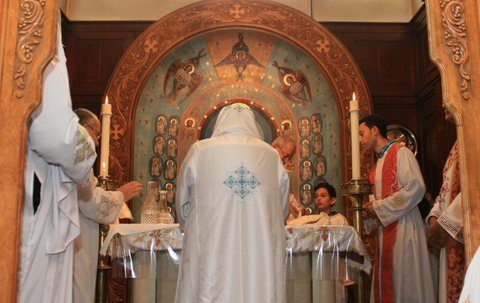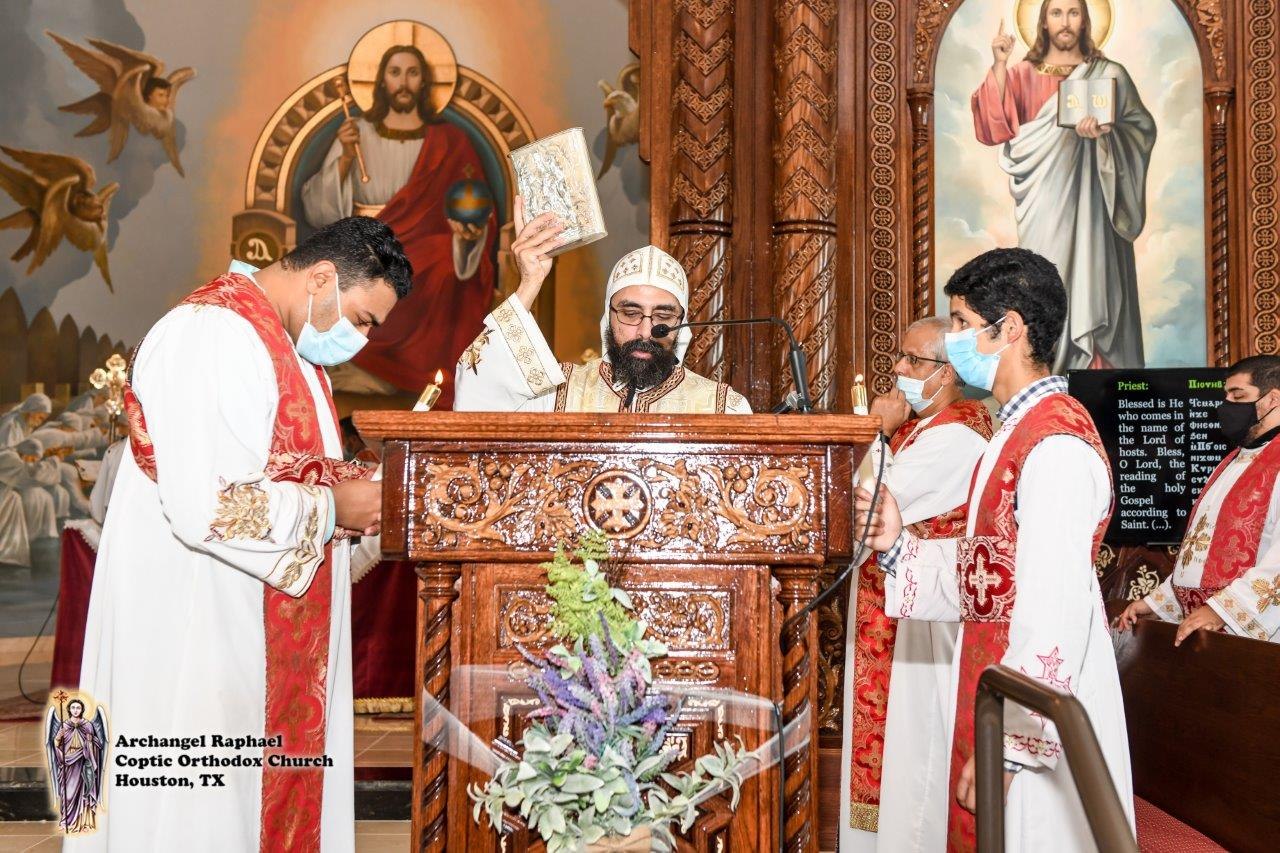Christ the Good Shepherd American Coptic Orthodox Church
For Christ. With Christ. In Christ.Through Christ.
What on earth is the Coptic Orthodox Christian Church?

The Coptic Orthodox Church is first and foremost a Christian Church. It is actually one of the original Christian Churches established approximately 46 AD by the Apostle Mark, who wrote the Gospel titled after his name. We are Christians, meaning we believe in the Holy Trinity as one God, the Father, the Son, and the Holy Spirit (Matthew 28:19). That our Lord, God, and Savior Jesus Christ came to earth, and became man while fully remaining God, born of the Virgin Mary. He taught us how to live as recorded in the four Gospels, was crucified, died, and rose again, to raise us up with Him. He came on the earth to establish His church, His briHisand the body of Christ, and the gates of Hades would not prevail against it (Matthew 16:18). He gave us His Holy Spirit in Baptism and through the laying on of Hands (Chrismation) to live in us and unite us with Him, until His second coming. Our church is the same church that was begun almost 2000 years ago.
Is “Orthodox Christianity” a denomination?

While there are tens of thousands of different Christian denominations worldwide, how do you know which denomination is correct? The Orthodox church is not a denomination (although we don’t call ourselves non-denominational). We are actually pre-denominational! The Coptic Orthodox Church was one of the original five Christian Churches in the world, which included Jerusalem, Constantinople, Rome, and Antioch, at that time it was one Christian Faith. The Coptic church established almost 2000 years ago, is the same church that exists to this very day. The term Orthodox means the correct way to worship/right belief.
The Bible and the Church

Most Christians would agree that the Bible is one of the most important sources of authority, theology, and truth in a church. However, what happens when Christians disagree on the meaning of Bible verses? We believe that our Lord wants all Christians to live according to the truth of the Bible, for He said, “Man shall not live by bread alone, but by every word that proceeds from the mouth of God” (Matthew 4:4). However, instead of interpreting the Bible to fit our standards of today or manipulating verses to agree with individual belief systems, we look to the ancient church as an example and hold the writings of the early church fathers with great importance. As Orthodox Christians, Biblical teachings are not interpreted through individuals, whether scholars or teachers, we believe the truth is what the Church has always believed, at all times, everywhere, no matter the circumstance. No person is infallible in teaching, that is why the collective beliefs and writings of the early church fathers and the traditions the church has kept are of great importance to understanding God’s Word. The Bible makes it clear that The Church through Christ is the source of truth, “I write so that you may know how you ought to conduct yourself in the house of God, which is the church of the living God, the pillar and ground of the truth” (I Timothy 3:15). The Coptic Christian Church was the first church to declare and officially accept the current list of 27 books of the New Testament, this was done by St. Athanasius the Coptic Archbishop and Patriarch in the year 367. He was also the first author of the First Christian Creed (The Apostles Creed) heading the Council of Nicea. Christian Monasticism was begun by St. Anthony the Great in 269 AD. Also, the Coptic Church’s greatest testimony is the amount of bloodshed for the sake of Christ. It has historically been one of the most persecuted churches in the history of Christendom, with countless lives as well as church buildings destroyed for faith in Christ until this very day.
The Traditional Church

Aren’t “traditions” bad? Some are, and some are not. Man-made traditions should never be part of a church, however Godly traditions kept by the church are necessary. St. Paul tells us in II Thessalonians 2:15, “Therefore, brethren, stand fast and hold the traditions which you were taught, whether by word or our epistle.” The key question is who decides which traditions are man-made and which are the traditions that God wants us to keep? The answer is the collective body of the church guided by the Holy Spirit which has existed from the beginning of Christendom. The church has always been guided by the Holy Spirit, this was the promise of the Lord that after His Holy Ascension, that the Holy Spirit will teach us all things. The Lord told us, “However, when He, the Spirit of truth, has come, He will guide you into all truth” (John 16:13).
Salvation in the Orthodox Church

How does one get saved? We as Orthodox Christians believe that by God’s grace, we are saved, that we are being saved, and we will be saved. Salvation is not a moment in time. It is not a one-time decision or a simple acceptance of Christ as our personal Lord and Saviour. Faith in Christ is essential but not the only condition. We must be baptized as the Lord says in Mark 16:16, “He who believes and is baptized, will be saved.” Accepting the Lord Jesus as our Saviour and being baptized in His name is the first step, then we must receive the Holy Spirit inside of us (Acts 8:14-16). We must live what we believe, for a “tree is known by its fruit.” We must have a relationship with God and follow His commands (Matthew 7:23). We must follow all His teachings, including partaking of Communion, “Most assuredly I say unto you, unless you eat the flesh of the Son of Man and drink His blood you have no life in you” ( John 6:53). To receive forgiveness one must repent and confess their sins (I John 1:9). We also must have faith and works through love, in order to be saved (Gal. 5:6).
Graven Images, then why so many paintings?

The Images we have in the church are not idols or graven images that we worship. God directed His prophets to use images and artistry in worship (Exodus 25, Exodus 26:1, I Kings 6, etc.) Just as we worship God through prayer, praise, and music, we also worship through imagery, we do not worship the images themselves. These paintings are icons, which we call writings and “Windows to Heaven” for they tell a story. They are not meant to portray realistic images, yet hold much deeper meanings to teach the viewer about a Christ and His saints.
Why pray to the Virgin Mary and the saints?

We ask the saints to pray for us. We do not pray to/worship the saints, replacing our prayers to God. Just as Christians ask prayers from one another, we ask the saints to pray for us. Saints are intecessors (I Tim. 2:1) , Our Lord Jesus Christ is the One Mediator between the Father and us (I Tim. 2:5).
Why call priests fathers, when no one should be called Father
(Matthew 23:9)?

We do not understand this verse literally, because the Lord also told us to hate our fathers and mothers. He said these verses to show us how much more love and honor we should have for God. Christ gave us an illustration of calling someone on earth “father” in the story of the Prodigal Son. Paul often mentions of himself as father to many of his spiritual children in the New Testament.
Incense and Worship

God directed His children throughout the Old Testament to offer incense in worship. Christ received incense when the magi offered their gifts, and we also see in Revelation that there is incense in Heavenly worship (Rev. 5:8). The Church in its wisdom chose to use incense in worship, for we see that this is in accordance to Scripture.
Church Experience

The church gives us an opportunity to meet God in a full body and spirit experience. All the senses are attracted. Smell: Incense, Taste: Communion, Touch: Kiss of Peace, Sight: Iconography, Sound: Chanting and Praise. Our spirit is nourished by God’s Holy Spirit through worship and Communion. The church is a hospital for the sick soul, we all come to find healing in Christ. The goal is unity with God and one another through receiving of the Holy Eucharist, while repenting and confessing our sins. The Coptic Church has been preserved by four pillars that have continued for two thousand years, as the Lord taught the Disciples, continuing steadfastly in : the apostles’ doctrine (Bible) and fellowship, in the breaking of bread (Holy Communion), and in prayers (Acts 2:42). We pray for the full Unity of Christians built on the Truth of the Word of God (John 17).
